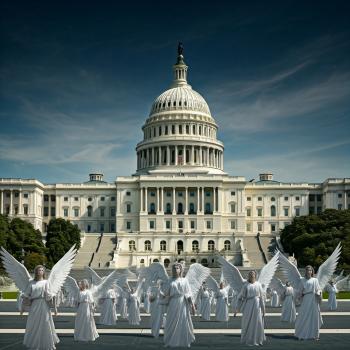As 2020 Presidential candidates road test their stump speeches, jockey to distinguish themselves in debates and search for faith outreach staff, now is the time for campaigns to plan how to connect with the decentralized, diverse, highly motivated communities of the Religious Left.
As a pastor who has worked in progressive faith communities nationwide for the past 25 years, I’ve watched Democrats cede religion to the Republican party in election after election. They’ve shied away from moral language on the trail and in their paid media. They’ve taken only tentative steps into congregational outreach. They’ve hired just a handful of religious outreach staff. Here are some thoughts on how aspiring elected officials can get right with the Religious Left — and why it’s important.
 A moral vision can power your campaign
A moral vision can power your campaign
Religious voters are looking for more than just a list of issue positions and policies. They want to know the values and vision that power your platform. For progressive faith voters, our traditions inspire us to seek justice and resist the tyranny of the pharaohs of the world. Our traditions contain radical themes such as Jubilee (debt relief), welcoming of immigrants and refugees and liberation of the captive that outstrip the ambitions of anything currently offered within the two-party system. The New Deal’s roots in Catholic Social Teaching and the civil rights movement’s grounding in the Black Church show that transformative policy change springs from moral frameworks, not a technocratic think tanks.
To set yourself apart and build authentic connection, share your moral vision. What are the right-and-wrong principles that unify your platform and guide your decision-making? What is the better world which you seek? Don’t just say “values” — name what your values are and where they come from. If you don’t name them, voters will assume you don’t have them.
This is a twofer. Progressives love it, and it will also resonate with moderate folks, some of whom want to know you have a moral compass more than they want you to agree with them on all issues. A vision that’s bigger than politics and grounded in the universal values shared by our faith and ethical traditions are what people of faith seek in a president.
Progressive politicians have lacked such a unifying and ambitious vision in recent years. Ticking off the litmus test positions and condemning Republicans’ policies and racism isn’t enough.
Speak from your own tradition and show respect for other traditions
If you are a person of faith, it’s okay to talk about how your specific tradition has inspired your commitment to your positions and informs who you are.
Julián Castro’s Catholicism is echoed in the way he roots his policy proposals in values like “human dignity,” as well as his decision to launch his presidential campaign on the feast day of the Virgin of Guadalupe. Pete Buttegeig talks about his Episcopalianism and his spiritual journey as a gay man; Cory Booker, a Christian, has an impressive command of Torah, and Elizabeth Warren draws on her time as a Sunday School teacher. Bernie Sanders, a self-described secular Jew, has gone to Rome to visit the Vatican and meet with Catholic leaders. You don’t need to be religious in order to share your moral worldview and respect religious people.
Progressive people of faith reject religious litmus tests, but we are inspired by our own religions and can identify with leaders who are similarly guided by their own — whatever that faith or ethical tradition may be.
Call out hypocrisy
Secular liberals, progressive people of faith and moderates are outraged by the moral hypocrisy of the Religious Right and the candidates they baptize. Not only do these charlatans harm disenfranchised and vulnerable people in service of greed and power, they do so in the name of God. We cannot abide it.
By naming the contradiction between the actual teachings of our faiths and Republican policies and values, candidates can thwart the religious right’s attempts to impose their beliefs on the rest of the nation. Calling their hypocrisy out with a theological counter-argument rather than simply invoking the principle of separation of church and state will signal that candidates value the positive contributions faith communities make to justice movements. You can build bridges with religious voters without leaving faith out of the public narrative altogether.
Be bold
The media often uses “faith outreach” as shorthand for “socially conservative white Christian outreach.” Don’t fall for this misconception. The Religious Left is looking for boldness, conviction and policies that are equal to this moment in history. The 2020 election is a battle for the values that will shape our future.
Progressives often mistakenly think that religious outreach means tacking to the right. But many people support reproductive rights and LGBTQ equality because of their faith and values. Candidates should clearly stake out their positions and go beyond rights-based defenses by talking about human dignity, women’s moral agency and family. Just like on other issues, modeling thoughtfulness and bringing values into the conversation is both motivating and persuasive.
The Religious Right has a head start of about 40 years. But the Religious Left is reawakening. Candidates who engage us with humility, authenticity and thoughtfulness are poised to tap into a powerful and growing movement.
















